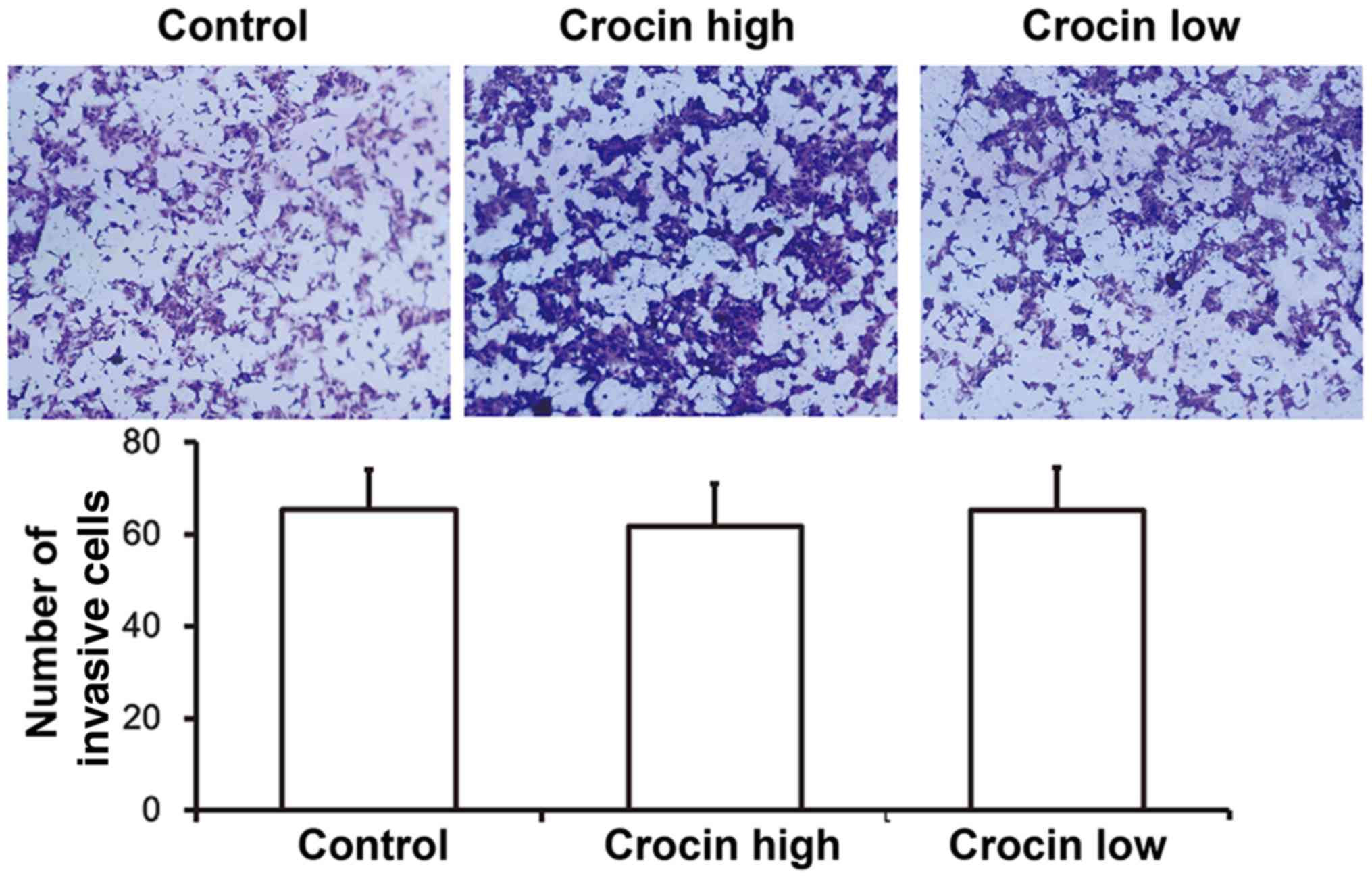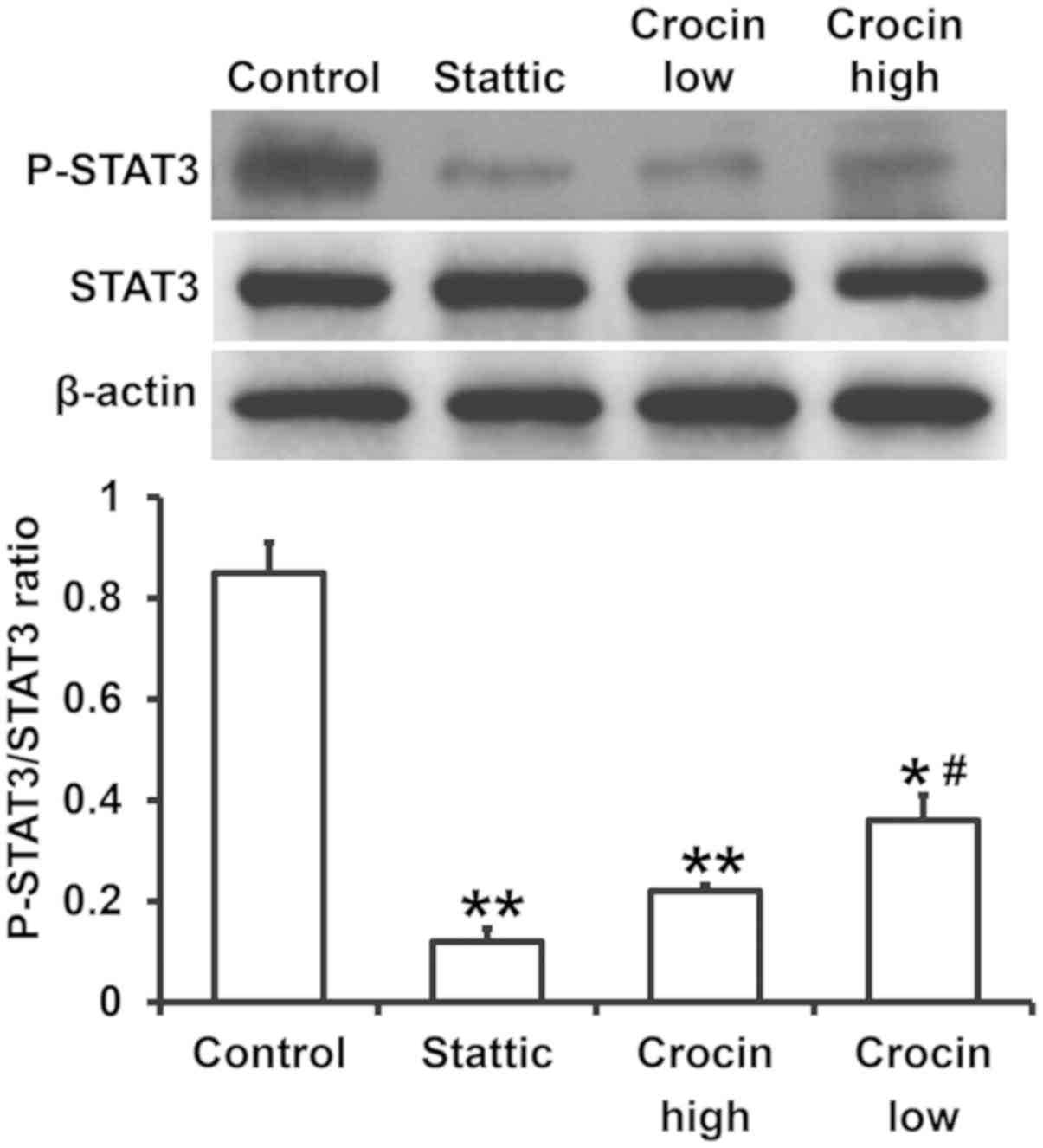|
1
|
Lee IA, Lee JH, Baek NI and Kim DH:
Antihyperlipidemic effect of crocin isolated from the fructus of
Gardenia jasminoides and its metabolite Crocetin. Biol Pharm Bull.
28:2106–2110. 2005. View Article : Google Scholar : PubMed/NCBI
|
|
2
|
Abe K and Saito H: Effects of saffron
extract and its constituent crocin on learning behaviour and
long-term potentiation. Phytother Res. 14:149–152. 2000. View Article : Google Scholar : PubMed/NCBI
|
|
3
|
Sun Y, Xu HJ, Zhao YX, Wang LZ, Sun LR,
Wang Z and Sun XF: Crocin exhibits antitumor effects on human
leukemia HL-60 cells in vitro and in vivo. Evid Based Complement
Alternat Med. 2013:6901642013. View Article : Google Scholar : PubMed/NCBI
|
|
4
|
He SY, Qian ZY, Tang FT, Wen N, Xu GL and
Sheng L: Effect of crocin on experimental atherosclerosis in quails
and its mechanisms. Life Sci. 77:907–921. 2005. View Article : Google Scholar : PubMed/NCBI
|
|
5
|
Nair SC, Kurumboor SK and Hasegawa JH:
Saffron chemoprevention in biology and medicine: A review. Cancer
Biother. 10:257–264. 1995. View Article : Google Scholar : PubMed/NCBI
|
|
6
|
Hsu JD, Chou FP, Lee MJ, Chiang HC, Lin
YL, Shiow SJ and Wang CJ: Suppression of the TPA-induced expression
of nuclear-protooncogenes in mouse epidermis by crocetin via
antioxidant activity. Anticancer Res. 19:4221–4227. 1999.PubMed/NCBI
|
|
7
|
Li K, Li Y, Ma Z and Zhao J: Crocin exerts
anti-inflammatory and anti-catabolic effects on rat intervertebral
discs by suppressing the activation of JNK. Int J Mol Med.
36:1291–1299. 2015. View Article : Google Scholar : PubMed/NCBI
|
|
8
|
Tamaddonfard E, Farshid AA, Eghdami K,
Samadi F and Erfanparast A: Comparison of the effects of crocin,
safranal and diclofenac on local inflammation and inflammatory pain
responses induced by carrageenan in rats. Pharmacol Rep.
65:1272–1280. 2013. View Article : Google Scholar : PubMed/NCBI
|
|
9
|
Chen W, Zheng R, Baade PD, Zhang S, Zeng
H, Bray F, Jemal A, Yu XQ and He J: Cancer statistics in China,
2015. CA Cancer J Clin. 66:115–132. 2016. View Article : Google Scholar : PubMed/NCBI
|
|
10
|
Thosani N, Guha S and Singh H: Colonoscopy
and colorectal cancer incidence and mortality. Gastroenterol Clin
North Am. 42:619–637. 2013. View Article : Google Scholar : PubMed/NCBI
|
|
11
|
Wang K and Karin M: Tumor-elicited
inflammation and colorectal cancer. Adv Cancer Res. 128:173–196.
2015. View Article : Google Scholar : PubMed/NCBI
|
|
12
|
Chung KS, Cheon SY, Roh SS, Lee M and An
HJ: Chemopreventive effect of aster glehni on inflammation-induced
colorectal carcinogenesis in mice. Nutrients. 10(pii): E2022018.
View Article : Google Scholar : PubMed/NCBI
|
|
13
|
Ray AL, Berggren KL, Restrepo Cruz S, Gan
GN and Beswick EJ: Inhibition of MK2 suppresses IL-1β, IL-6, and
TNF-α-dependent colorectal cancer growth. Int J Cancer.
142:1702–1711. 2018. View Article : Google Scholar : PubMed/NCBI
|
|
14
|
Li CY, Huang WF, Wang QL, Wang F, Cai E,
Hu B, Du JC, Wang J, Chen R, Cai XJ, et al: Crocetin induces
cytotoxicity in colon cancer cells via p53-independent mechanisms.
Asian Pac J Cancer Prev. 13:3757–3761. 2012. View Article : Google Scholar : PubMed/NCBI
|
|
15
|
Arocho A, Chen B, Ladanyi M and Pan Q:
Validation of the 2-DeltaDeltaCt calculation as an alternate method
of data analysis for quantitative PCR of BCR-ABL P210 transcripts.
Diagn Mol Pathol. 15:56–61. 2006. View Article : Google Scholar : PubMed/NCBI
|
|
16
|
Livak KJ and Schmittgen TD: Analysis of
relative gene expression data using real-time quantitative PCR and
the 2(-Delta Delta C(T)) method. Methods. 25:402–408. 2001.
View Article : Google Scholar : PubMed/NCBI
|
|
17
|
Kim WH, An HJ, Kim JY, Gwon MG, Gu H, Lee
SJ, Park JY, Park KD, Han SM, Kim MK and Park KK: Apamin inhibits
TNF-α- and IFN-γ-induced inflammatory cytokines and chemokines via
suppressions of NF-κB signaling pathway and STAT in human
keratinocytes. Pharmacol Rep. 69:1030–1035. 2017. View Article : Google Scholar : PubMed/NCBI
|
|
18
|
Edwards BK, Ward E, Kohler BA, Eheman C,
Zauber AG, Anderson RN, Jemal A, Schymura MJ, Lansdorp-Vogelaar I,
Seeff LC, et al: Annual report to the nation on the status of
cancer, 1975–2006, featuring colorectal cancer trends and impact of
interventions (risk factors, screening, and treatment) to reduce
future rates. Cancer. 116:544–573. 2010. View Article : Google Scholar : PubMed/NCBI
|
|
19
|
Franko J, Shi Q, Goldman CD, Pockaj BA,
Nelson GD, Goldberg RM, Pitot HC, Grothey A, Alberts SR and Sargent
DJ: Treatment of colorectal peritoneal carcinomatosis with systemic
chemotherapy: A pooled analysis of north central cancer treatment
group phase III trials N9741 and N9841. J Clin Oncol. 30:263–267.
2012. View Article : Google Scholar : PubMed/NCBI
|
|
20
|
P Z and C L: Research progress of
anticancer active substances in Crocus sativus. Int J
Laboratory Med. 2:140–142. 2006.
|
|
21
|
Mousavi SH, Moallem SA, Mehri S,
Shahsavand S, Nassirli H and Malaekeh-Nikouei B: Improvement of
cytotoxic and apoptogenic properties of crocin in cancer cell lines
by its nanoliposomal form. Pharm Biol. 49:1039–1045. 2011.
View Article : Google Scholar : PubMed/NCBI
|
|
22
|
Sun J, Xu XM, Ni CZ, Zhang H, Li XY, Zhang
CL, Liu YR, Li SF, Zhou QZ and Zhou HM: Crocin inhibits
proliferation and nucleic acid synthesis and induces apoptosis in
the human tongue squamous cell carcinoma cell line Tca8113. Asian
Pac J Cancer Prev. 12:2679–2683. 2011.PubMed/NCBI
|
|
23
|
Garcia-Olmo DC, Riese HH, Escribano J,
Ontañón J, Fernandez JA, Atiénzar M and García-Olmo D: Effects of
long-term treatment of colon adenocarcinoma with crocin, a
carotenoid from saffron (Crocus sativus L.): An experimental
study in the rat. Nutr Cancer. 35:120–126. 1999. View Article : Google Scholar : PubMed/NCBI
|
|
24
|
Magesh V, Singh JP, Selvendiran K,
Ekambaram G and Sakthisekaran D: Antitumour activity of crocetin in
accordance to tumor incidence, antioxidant status, drug
metabolizing enzymes and histopathological studies. Mol Cell
Biochem. 287:127–135. 2006. View Article : Google Scholar : PubMed/NCBI
|
|
25
|
Huang Y, Wang S, Zhang C, Xu Z, Shen J, Du
X, Zhang H, Zhang K and Zhang D: Experimental study of the
anti-atherosclerotic effect of demethylzeylasteral. Exp Ther Med.
13:2787–2792. 2017. View Article : Google Scholar : PubMed/NCBI
|
|
26
|
Itatani Y, Kawada K, Inamoto S, Yamamoto
T, Ogawa R, Taketo MM and Sakai Y: The role of chemokines in
promoting colorectal cancer invasion/metastasis. Int J Mol Sci.
17(pii): E6432016. View Article : Google Scholar : PubMed/NCBI
|
|
27
|
Shen L, Zhou T, Wang J, Sang X, Lan L, Luo
L and Yin Z: Daphnetin reduces endotoxin lethality in mice and
decreases LPS-induced inflammation in Raw264.7 cells via
suppressing JAK/STATs activation and ROS production. Inflamm Res.
66:579–589. 2017. View Article : Google Scholar : PubMed/NCBI
|
|
28
|
Hao C, Wu B, Hou Z, Xie Q, Liao T, Wang T
and Ma D: Asiatic acid inhibits LPS-induced inflammatory response
in human gingival fibroblasts. Int Immunopharmacol. 50:313–318.
2017. View Article : Google Scholar : PubMed/NCBI
|
|
29
|
Kim KJ, Yoon KY, Yoon HS, Oh SR and Lee
BY: Brazilein suppresses inflammation through inactivation of
IRAK4-NF-κB pathway in LPS-induced Raw264.7 macrophage cells. Int J
Mol Sci. 16:27589–27598. 2015. View Article : Google Scholar : PubMed/NCBI
|
|
30
|
Wang ZW, Wang JJ, Zhang JZ, Xue ZJ, Miao
J, Li L and Hu WX: Thrombolysis of deep vein thrombosis and
inhibiting chemotaxis of macrophage by MCP-1 blockage. Eur Rev Med
Pharmacol Sci. 21:1695–1701. 2017.PubMed/NCBI
|
|
31
|
Hol J, Wilhelmsen L and Haraldsen G: The
murine IL-8 homologues KC, MIP-2, and LIX are found in endothelial
cytoplasmic granules but not in Weibel-Palade bodies. J Leukoc
Biol. 87:501–508. 2010. View Article : Google Scholar : PubMed/NCBI
|
|
32
|
Kadioglu A and Andrew PW: Susceptibility
and resistance to pneumococcal disease in mice. Brief Funct Genomic
Proteomic. 4:241–247. 2005. View Article : Google Scholar : PubMed/NCBI
|
|
33
|
Gerber J, Pohl K, Sander V, Bunkowski S
and Nau R: Rifampin followed by ceftriaxone for experimental
meningitis decreases lipoteichoic acid concentrations in
cerebrospinal fluid and reduces neuronal damage in comparison to
ceftriaxone alone. Antimicrob Agents Chemother. 47:1313–1317. 2003.
View Article : Google Scholar : PubMed/NCBI
|



















